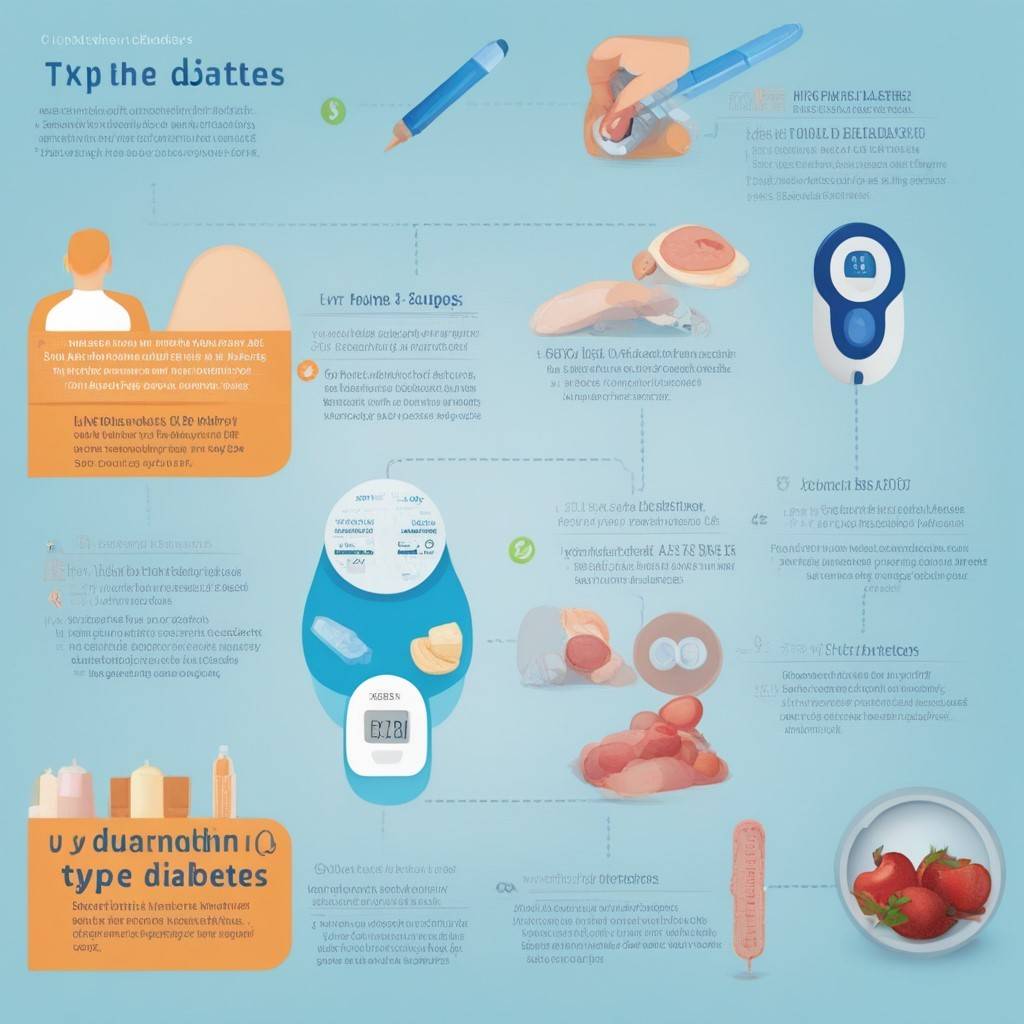Embark on a health revolution with Diabetes Type 2 Intermittent Fasting! Discover the transformative power of balanced living for a brighter, healthier you.
Diabetes Type 2 Intermittent Fasting (IF) is emerging as a transformative approach to managing this prevalent chronic condition. This blog post aims to delve deep into the nuances of IF, particularly its impact on Type 2 Diabetes, providing comprehensive, actionable insights for those seeking a new path in their diabetes management journey.
Understanding Type 2 Diabetes

What is Type 2 Diabetes?
Before we talk about Diabetes Type 2 Intermittent Fasting. We will dive into what is the Type 2 diabetes first.
Type 2 Diabetes, a chronic condition affecting millions globally, occurs when the body becomes resistant to insulin or doesn’t produce enough. Unlike Type 1 Diabetes, which is typically diagnosed in childhood and involves the body’s inability to produce insulin, Type 2 often develops in adulthood and is closely linked to lifestyle factors.
- Prevalence: According to the CDC, over 34 million Americans have diabetes, and 90-95% of these cases are Type 2.
- Risk Factors: Obesity, physical inactivity, and a family history of diabetes significantly increase the risk.
Causes and Risk Factors
Type 2 Diabetes is not a one-cause condition. It stems from a mix of genetic and lifestyle factors. Key factors include:
- Genetics: A family history of diabetes increases risk.
- Lifestyle: A sedentary lifestyle, unhealthy diet, and obesity are major contributors.
- Age and Ethnicity: Risk increases with age and is higher in certain ethnic groups.
Common Symptoms and Complications
The symptoms of Type 2 Diabetes often develop gradually and include increased thirst, frequent urination, hunger, fatigue, and blurred vision. If not managed well, it can lead to serious complications like:
- Heart Disease
- Kidney Damage
- Vision Impairment
Case Study Highlight: A study published in the Journal of Diabetes & Metabolic Disorders emphasized the importance of early symptom recognition to prevent complications.
The Basics of Intermittent Fasting

What is Intermittent Fasting?
Intermittent Fasting (IF) is a dietary approach characterized by cycles of fasting and eating. Unlike traditional diets that focus on what to eat, IF concentrates on when to eat. Common IF methods include:
- 16/8 Method: Fasting for 16 hours and eating within an 8-hour window.
- 5:2 Diet: Eating normally for 5 days and reducing calorie intake for 2 non-consecutive days.
- Eat-Stop-Eat: This is like a day-off diet. You fast for a whole day once or twice a week. You give your body a break from food, and it gets a chance to reset.
Remember, it’s not about starving yourself but giving your body a break to handle sugars better.
How Intermittent Fasting Works
Let’s break it down to a level where it’s as simple as pie. When you eat, your body gets busy processing all the food, especially those sugary bits. Now, when you give your body a break from eating (that’s the fasting part), it has time to use up stored sugar for energy.
Imagine it like this: Eating is like putting firewood in a furnace. Fasting is when the furnace uses up all the firewood before you add more. This helps your body manage sugar levels better.
The Science Behind Intermittent Fasting
Intermittent Fasting works by periodically reducing your calorie intake, which can lead to several beneficial changes in the body:
- Improved Insulin Sensitivity: IF can enhance the body’s response to insulin, which is crucial for those with Type 2 Diabetes.
- Changes in Hormone Levels: Fasting influences hormone levels, facilitating weight loss and metabolic health.
Benefits and Challenges
IF offers a range of health benefits, but it also comes with challenges:
Benefits:
- Weight Loss: By limiting the eating window, IF can naturally reduce calorie intake.
- Improved Blood Sugar Control: IF can help in stabilizing blood glucose levels.
- Heart Health: Studies suggest a positive effect on blood pressure and cholesterol levels.
Challenges:
- Adjustment Period: Adapting to the new eating pattern can be tough initially.
- Social and Lifestyle Impact: Fasting can affect social eating patterns and lifestyle.
Fact Check: A 2019 review in the New England Journal of Medicine highlighted the potential of IF in improving multiple health markers, including weight loss and improved heart health.
Diabetes Type 2 Intermittent Fasting
The Impact of IF on Blood Sugar Levels
Intermittent Fasting has shown promise in its ability to regulate blood sugar levels, a key concern for individuals with Type 2 Diabetes. Here’s how IF can make a difference:
- Enhanced Insulin Sensitivity: IF can improve the body’s responsiveness to insulin, potentially reducing the need for medication.
- Reduced Blood Sugar Variability: Regular fasting periods can help stabilize blood sugar levels, decreasing the spikes and drops often experienced by diabetics.
Research and Studies
The link between Diabetes Type 2 Intermittent Fasting (IF) management has been the subject of numerous studies:
- Study 1: A 2018 study in the journal “Cell Metabolism” found that IF improved insulin sensitivity and pancreatic function in diabetic rats.
- Study 2: The “Diabetes Care” journal reported that IF led to significant weight loss and improved fasting glucose in human participants with Type 2 Diabetes.
Personal Stories and Testimonials
Real-life experiences often provide the most compelling evidence:
- Case Study: John, a 45-year-old with Type 2 Diabetes, shared his story of how adopting a 16/8 IF routine, along with medication, led to a dramatic improvement in his HbA1c levels.
- Testimonial: Emma, diagnosed with Type 2 Diabetes, found that IF helped her lose weight and reduce her dependency on insulin.
Expert Quote: Dr. Sarah Hallberg, a diabetes expert, states, “Intermittent Fasting offers a realistic, sustainable approach to managing Type 2 Diabetes, especially when combined with a low-carb diet.
Implementing Diabetes Type 2 Intermittent Fasting Management

Getting Started with IF
Beginning Diabetes Type 2 Intermittent Fasting (IF) management requires a structured approach. Here’s a step-by-step guide to get started:
- Consult a Healthcare Professional: Before starting IF, consult your doctor, especially if you’re on diabetes medication.
- Choose Your IF Method: Select an IF plan that fits your lifestyle, like the 16/8 method or the 5:2 diet.
- Set Realistic Goals: Start with shorter fasting periods and gradually increase as your body adapts.
Monitoring and Adjusting
Continuous monitoring and adjustment are key to safely practicing IF with Type 2 Diabetes:
- Blood Sugar Monitoring: Regularly check your blood sugar levels to observe how IF affects your diabetes.
- Adjusting IF Schedules: Based on your blood sugar readings and how you feel, adjust your fasting periods and eating windows.
- Consult Regularly with Healthcare Providers: Keep your healthcare team informed about your IF journey for personalized advice.
Diet and Nutrition Considerations
What you eat during your eating windows is just as important as the fasting itself:
- Balanced Diet: Focus on a diet rich in vegetables, lean proteins, and healthy fats.
- Carbohydrate Management: Be mindful of carbohydrate intake as it directly impacts blood sugar levels.
- Hydration: Maintain adequate hydration during fasting periods.
List of Suggested Foods:
- Vegetables: Broccoli, spinach, bell peppers.
- Proteins: Chicken breast, tofu, legumes.
- Healthy Fats: Avocado, nuts, olive oil.
Table: Sample IF Meal Plan for a Day
| Time | Meal | Description |
| 12:00 PM | Lunch | Grilled chicken salad with mixed greens and quinoa |
| 3:00 PM | Snack | A handful of almonds and a piece of fruit |
| 7:00 PM | Dinner | Baked salmon with steamed vegetables and brown rice |
Tips for Diabetes Type 2 Intermittent Fasting
Now, if you’ve got diabetes type 2 and you’re thinking of giving intermittent fasting a try, here are some down-to-earth tips:
- Talk to Your Squad: Before starting anything new, especially with diabetes in the picture, have a chat with your healthcare team. They know what’s best for you.
- Start Slow: Don’t go all superhero from day one. Begin with a smaller fasting window, and as your body gets used to it, you can stretch it out.
- Stay Hydrated: Water is your buddy. It keeps you hydrated and can help curb hunger during fasting hours. Plus, it’s just good for you, in general.
- Choose Wisely: When you do eat, pick the good stuff. Veggies, lean proteins, and whole grains are like the superheroes of your food choices.
Expert Opinions and Medical Advice for Diabetes Type 2 Intermittent Fasting
Healthcare Professionals’ Views on IF and Diabetes
The medical community offers diverse perspectives on the use of Intermittent Fasting in managing Type 2 Diabetes. Key insights include:
- Endocrinologists’ Take: Many diabetes specialists recognize IF as a tool for weight management and improved insulin sensitivity, but they emphasize individualized approaches.
- Nutritionists’ Advice: Dietitians often advocate for a balanced diet during eating periods and stress the importance of nutrient-rich foods.
Precautions and Contraindications
While IF can be beneficial, it’s not suitable for everyone. Certain conditions warrant caution:
- Hypoglycemia Risk: For those on insulin or certain diabetes medications, there’s a risk of low blood sugar levels during fasting.
- Renal Conditions: Patients with kidney issues should consult their doctors, as fasting can affect renal function.
- Pregnancy and Breastfeeding: IF is not recommended during pregnancy and breastfeeding.
Expert Quote: Dr. Jason Fung, a leading expert in Intermittent Fasting, states, “While IF can be a powerful tool in diabetes management, it needs to be tailored to individual health needs and closely monitored.
Fact Box:
- IF should always be complemented by regular medical consultations.
- Adjustments to diabetes medication may be required when starting IF.
Safe Ways for Diabetes Type 2 Intermittent Fasting
Safety first, always! Here are some easy-peasy, no-nonsense ways to make sure intermittent fasting plays nice with your diabetes:
- Regular Check-ins: Keep an eye on your blood sugar levels. If things start acting up, it’s time for a pow-wow with your healthcare team.
- Listen to Your Body: If you’re feeling off during fasting, it’s okay to hit the brakes. Intermittent fasting is not a one-size-fits-all deal.
- Stay Consistent: Once you find a fasting routine that suits you, stick with it. Consistency is like the secret sauce in this whole intermittent fasting recipe.
Remember, the goal is to make life better, not complicated. So, take it easy, and let your body find its rhythm.
Frequently Asked Questions (FAQs) about Diabetes Type 2 Intermittent Fasting
In this section, we address some of the most common questions related to Diabetes Type 2 Intermittent Fasting (IF)
Q1: Can Intermittent Fasting Reverse Type 2 Diabetes? A: While IF can’t “reverse” Type 2 Diabetes, it can significantly improve blood sugar control and insulin sensitivity, potentially reducing the need for medication.
Q2: Is it safe to practice IF while on diabetes medication? A: It can be safe, but it’s crucial to consult with a healthcare provider as medication adjustments may be necessary.
Q3: How quickly can I see results from IF in managing my diabetes? A: Results can vary. Some people see improvements in blood sugar levels within weeks, while for others, it may take longer.
Q4: Can I practice IF every day? A: Yes, methods like the 16/8 can be practiced daily, but it’s essential to listen to your body and make adjustments as needed.
Q5: Are there any side effects of IF for diabetics? A: Potential side effects include hypoglycemia, especially for those on insulin or sulfonylureas, and temporary fatigue during the adjustment period.
Intermittent Fasting and Type 2 Diabetes: Is It Safe?
Absolutely, it can be safe, but it’s like a dance – you’ve got to know the steps. Talk to your healthcare team first. They’re like your dance instructors, guiding you to make sure it’s safe for you. Teamwork makes the dream work!
Can Intermittent Fasting Cause Diabetes?
Nope, it doesn’t cause diabetes. It’s like a helper in the diabetes tango. Intermittent fasting might help manage blood sugar levels better. But again, check in with your healthcare squad before busting any moves.
What Are the Benefits of Intermittent Fasting for Diabetes?
Picture this: Intermittent fasting is like a superhero cape for your body. It can help control blood sugar levels, improve insulin sensitivity, and even give your pancreas a breather. Plus, it’s like a gentle nudge to those extra pounds – helps with weight management, too!
Is Intermittent Fasting Safe for Diabetes?
Done right, it’s safe and sound. Start slow, keep an eye on your blood sugar levels, and don’t skip the buddy system – that’s your healthcare team. They’ll keep you on the safe side of the street.
Can Intermittent Fasting Reverse Diabetes?
Well, it’s like a superhero origin story. For some folks, intermittent fasting has helped put type 2 diabetes into remission. But remember, everyone’s story is different. Consult your healthcare heroes for personalized advice.
Intermittent Fasting Can Help Reach Remission for Type 2 Diabetes
It’s like a journey. Some people have found that with intermittent fasting, they’ve reached a point where their type 2 diabetes is like, “I’m outta here!” Remission doesn’t mean it’s gone forever, but it’s a step in the right direction.
How to Time Meals While Intermittent Fasting for Diabetes?
Timing is key. Imagine your meals are like guests at a party. You’ve got a fasting window, and when that’s done, it’s time for the feast. Spread your meals through this time, and keep it balanced – veggies, lean proteins, and whole grains. It’s like hosting a party for your body!
Remember, you’re the VIP, and your healthcare team is the event planner. Together, you’ll make sure the party is a hit!
Block Quote: “Intermittent Fasting represents a shift in the paradigm of diabetes management, focusing on timing rather than just diet” – Dr. Mark Mattson, Neuroscientist.
Conclusion: Your Health Upgrade Starts Now!
We’ve uncovered the secrets of Diabetes Type 2 Intermittent Fasting, your ticket to a health revolution! Understanding diabetes, the science of fasting, and real success stories – it’s all here.
Why Does It Matter? Type 2 Diabetes can be tough, but Intermittent Fasting is your superhero move. It helps your body handle sugars better, improving insulin sensitivity and keeping blood sugar in check.



